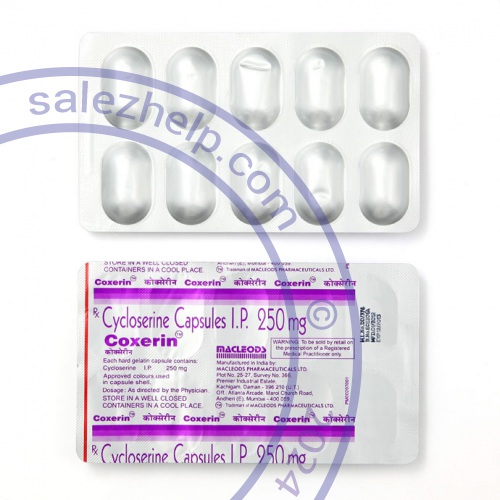Seromycin Singapore
Seromycin, also known as Cycloserine, is an oral antibiotic medication used primarily in the treatment of tuberculosis. It functions by inhibiting the bacteria's cell wall synthesis. It's commonly utilized as a secondary medication for patients with multi-drug resistant TB or when first-line treatments fail or cause adverse effects. Side effects may include anxiety, confusion, dizziness, and potential kidney damage. As with any antibiotic, it's important to complete the entire course of treatment to prevent drug-resistant bacteria from developing.
- 250mg
1. **What is Seromycin?**
Seromycin is an antibiotic traditionally used for treating tuberculosis, a serious bacterial infection. It's also known as Cycloserine. It works by inhibiting the construction of the bacteria's cell walls which hinders their growth and multiplication.
2. **How is Seromycin used?**
Seromycin is usually taken orally, twice a day, for a prescribed amount of time, often as part of a comprehensive treatment plan. The duration of treatment can be several months. It is crucial to follow the doctor’s instructions strictly to prevent the emergence of drug-resistant strains of tuberculosis.
3. **What is the usual dosage for Seromycin?**
The typical adult dose for Seromycin as an initial treatment is typically 250 mg, taken orally every 12 hours. However, the dosage can be adjusted by your doctor based on your medical condition, weight, and response to the treatment.
4. **Are there potential side effects of Seromycin?**
Yes, like any medication, Seromycin can cause side effects. These might include anxiety, confusion, dizziness, or somnolence. In more severe cases, it may cause liver or kidney damage. If you experience any severe or persistent side effects, it's important to seek immediate medical attention.
5. **Can Seromycin be taken along with other medications?**
Seromycin could interact negatively with certain medications. It's important to provide your doctor with a complete list of all medications you might be taking. Some combinations (for example ethionamide or isoniazid) should be avoided, others may need dose adjustment or special monitoring.
6. **Can pregnant or breastfeeding women take Seromycin?**
Pregnant or breastfeeding women should only take Seromycin if absolutely necessary, and always under the supervision of a healthcare professional. Studies show it can cross the placenta and it is excreted in human milk which may pose a risk to the baby.
7. **What should I do if I miss a dose of Seromycin?**
If you miss a dose of Seromycin, take it as soon as you remember. However, if it’s near the time for your next dose, skip the missed dose and continue on your regular dosing schedule. Neglecting doses may increase the risk of further drug-resistant TB development.
8. **What needs to be monitored when taking Seromycin?**
When on Seromycin, your healthcare provider will regularly monitor your liver and kidney functions, as well as check for potential neurological side effects such as peripheral neuropathy. Regular tests may be required to detect these problems early.
9. **How do I store Seromycin?**
Seromycin should be stored at room temperature, away from light and moisture. Keep out of reach of children. It's essential to dispose of expired or unused medications properly and never include them in household trash or pour them into drains unless instructed to do so.
What are known local names of the medication?
- Cycloserine



